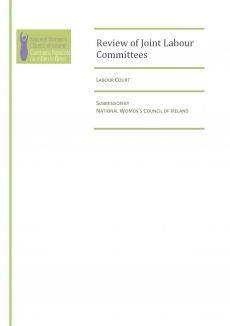Why we need the Joint Labour Committees - NWCI Submision on the Review of JLCs
Published: Wednesday, March 13, 2013

The JLCs regulate areas of work that are generally paid at rates marginally above the statutory minimum wage. They are acknowledged as being important in the absence of a fair system to determine wages at this level. The JLCs are a significant concern to the NWCI in the context of its work on Women and Economic Independence as a number of the sectors governed by JLCs are predominantly made up of women employees.
According to the latest figures available[1], for example, there are 511,600 people employed in the Administrative and Secretarial, the Caring, Leisure and Other Services and the Sales and Customer Services industries. These are some of the areas that are covered by the JLCs. Women comprise 77% of the workforce in these areas, and 46% of women in work are employed in these sectors. While not all of these employees are covered by the wage setting mechanisms under consideration in this Review (and indeed these mechanisms cover other occupations in addition to these) they represent a large proportion of those who are covered, and a significant proportion of female employees.
The JLCs are currently being reviewed by the Labour Court. In its submission, the NWCI called for the maintenance of the JLCs as a wage setting mechanism as an equality imperative and an economic necessity. In addition, we called for the right to collective bargaining. Being able to negotiate appropriate conditions to both maintain jobs and provide decent terms and conditions of employment is an issue of fundamental rights and must be maintained.
Read our Submission on the Joint Labour Committees
[1] CSO 2013, Quarterly National Household Survey, Quarter 4 2012
